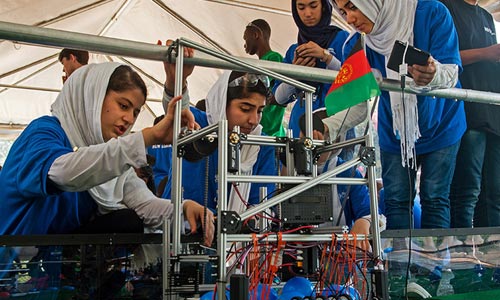If I were an Afghan feminist, then I wouldn’t spend my time complaining that the Americans haven’t pulled out a chair for me “at the table.” I’d march up to the table on my own. I would form a delegation and go speak to the Taliban directly,” wrote Cheryl Benard in her recent commentary in The National Interest titled “Afghan Women are In Charge of their Own Fate”.
Benard also said that the Taliban were not the “worst problem” of Afghan women but “deep-seated cultural values and traditions, such as the so-called Pashtun “honor code,” are far more devastating to women’s lives, and most of these are clearly un-Islamic or even anti-Islamic.” She also approved of the Taliban’s Moscow Declaration that despite 17 years of investment on women’s rights, women lose their lives during delivery “due to lack of health facilities”.
However, Benard did not point out the progress made by Afghan women in the past 17 years. She did not mention a single female ambassador, minister, deputy minister, governor, MP, lecturer, teacher or trader to show that how Afghan women made strides on the long road.
Benard made no mention of how Afghan women backtracked in light of the civil conflict and the Taliban’s repressive and despotic regime and how long it will take to make it from the beginning.
The progress made by Afghan women within the past 17 years is undeniable. They also fought for their rights and freedoms, raised their voice against injustice, participated in demonstrations for supporting their human rights, and participated in social and political decision makings. Afghan women had their representatives in Loya Jirga for the approval of constitution, they participated in presidential and provincial elections to defend their rights and gained seats in parliament, they studied hard to hold better positions in social and political arenas. For example, Afghan women are acting as ministers, ambassadors, MPs, etc. Recently, a woman, Adela Raz, has been appointed as Permanent Representative of Afghanistan to the United Nations. Afghan women also play active role in social, cultural, educational and economic arenas. They are teachers, doctors, engineers, lecturers, and traders, to name but a few. To put it succinctly, Afghan women made great progress in social, cultural, political, and economic arenas if one compares them with two decades ago.
Although Benard referred to deep-seated traditional culture of Afghanistan but did not mention the Taliban’s role in this regard. To ponder over this issue, traditional culture, which has curtailed the freedom of Afghan women to a great extent, came from the same ideology as that of the Taliban. To adopt iconoclastic approach, both men and women have to undermine radical ideology and un-Islamic or anti-Islamic interpretation of religious tenets in one way or another. Meanwhile, it should be noted that the Taliban supported and reinforced the “honor code” and imposed their radical mindset on a large number of youths in tribal belts. In other words, the Taliban supported tribal code of conduct – which are mostly un-Islamic or anti-Islamic – conducted desert courts, flagellated women in tribal areas, burnt schools, etc. in the areas under their control.
Afghan women have to urge the Taliban’s interlocutors not to compromise their achievements at the table with the Taliban. Women have to raise their voice in this regard so that the agreement should not put their rights and freedoms at stake.
Women are worried that if the “Islamic Emirate” of the Taliban return with the same mindset and ideology as that during their regime, they would not accept such an agreement. The Taliban’s harsh practices are evident. For example, if the Taliban return with their guns and talk to people with the barrel of gun, what could Afghan women do?
Now Afghan women urge Benard’s spouse not to undo their achievements, but if the Taliban hold talks with Afghan government, Afghan women also have their representatives, who are members of High Peace Council (HPC). For instance, two women representatives, along with heads of political parties, participated in the Moscow summit.
All in all, in the post-Taliban administration, Afghan women have been playing highly essential role in collective life. Personally speaking, women’s active role in social and political issues, despite many cultural barriers, is jaw-dropping. But I have to admit that the strides made by Afghan women were not possible without the support of U.S. and its allies, and all those individuals such as Benard and her colleagues. The supports paved the ground for the progress of Afghan women and empowered them in social and political arenas have to be appreciated.
Home » Opinion » Afghan Women’s Achievements Undeniable
Afghan Women’s Achievements Undeniable
| Hujjatullah Zia

